
Related
Guests
- Salma HamamyPalestinian student organizer at the University of Michigan.
We speak with Palestinian American University of Michigan student Salma Hamamy, who was pepper-sprayed and beaten at the University of Michigan in Ann Arbor when the Gaza solidarity encampment there became the latest to be violently dismantled Tuesday morning in the nationwide crackdown on student-led protests in solidarity with Palestine. Student protesters set up the encampment about a month ago to demand the University of Michigan’s endowment divest from companies with ties to Israel, but school President Santa Ono claimed the peaceful action had become a threat to public safety. Dozens of officers raided the encampment before dawn, arresting and hospitalizing students after pepper-spraying and pushing them to the ground. “I repeatedly said that my family has been killed, and that is why I am here. And as I was saying that through the megaphone, police officers snatched the megaphone out from my hand,” says Hamamy. She explains the university has refused to discuss divestment with protesters. “Instead of meeting with us at the table and meeting with us at the encampment, they decided to meet us with violent force and chemical attacks.” University of Michigan President Santa Ono is slated to appear before Congress Thursday alongside the presidents of UCLA and Yale.
Transcript
AMY GOODMAN: This is Democracy Now!, democracynow.org, The War and Peace Report. I’m Amy Goodman, with Juan González.
We now look at the ongoing crackdown on student-led protests in solidarity with Palestine across U.S. college campuses. An encampment at the University of Michigan in Ann Arbor is the latest to be violently dismantled by police, and President Santa Ono claimed the peaceful action had become a threat to public safety. Dozens of officers dressed in riot gear, wielding batons, raided the encampment before dawn Tuesday, pepper-spraying and pushing students to the ground as they tore down the camp.
PROTESTERS: [shouting] Move, cops! Get out the way! Move, cops! Get out the way! We know you’re Israel-trained! We know you’re Israel-trained! Move, cops! Get out the way! Go!
AMY GOODMAN: At least four people were arrested Tuesday, while two others were hospitalized after being pepper-sprayed by police. Student protesters set up the encampment about a month ago, demanding the University of Michigan’s endowment divest from companies with ties to Israel. This comes as the school’s president, Santa Ono, is slated to appear before Congress tomorrow alongside the presidents of UCLA and Yale to testify about their responses to the student-led protests and how they’re addressing reports of antisemitism on campus.
For more, we’re joined by Salma Hamamy, Palestinian American student at the University of Michigan, who just graduated earlier this month. Salma is the president of the Students for Justice in Palestine chapter at the University of Michigan. On Tuesday morning, she was pepper-sprayed and beaten by police who raided the university pro-Palestine encampment, joining us from Southfield, Michigan.
Welcome back to Democracy Now!, Salma. Can you describe what happened yesterday? And just to be clear, this has all happened after graduation at Mich?
SALMA HAMAMY: Hi. Yes, it did all happen after graduation. Students at the encampment have been holding down the encampment long after, even after graduation.
And at approximately 5:40 a.m., police came in full riot gear, actually while we were having a church service on the Diag, moving them out and essentially giving us a 10-minute warning, saying that we must be cleared off of the encampment. However, that 10 minutes, surprisingly, turned into five minutes, and they immediately began to charge at the protesters and at the students with their batons and pepper spray. Nearly every step forward that they took, chemicals were being sprayed in every direction. As students were falling to the floor in agony and in pain, they continued to push forward, beating students with batons. And us, standing, we were trying to, you know, hold up onto the students who have fallen down and lift them and take them over to safety. Yet they even began to arrest students in that very moment. So, it was very difficult to keep track of who’s being arrested, because, you know, we unfortunately could not see in those moments due to the chemical attacks directly sprayed onto our eyes. And they constantly pushed us further and further back. It took them about half an hour to entirely remove us from the encampment, as we tried our absolute hardest to remain strong and remain standing at the encampment. However, as we were pushed further and further back, students, unfortunately, were unable to remain standing due to the pepper spray and due to the intense beating with the batons, as well. Students’ phones were even confiscated as we were recording them.
I, personally, myself, was holding a megaphone, and kept a reasonable distance from the cops, as well, as I was chanting, specifically emphasizing why I was there and why I was protesting at the encampment. I repeatedly said that my family has been killed, and that is why I’m here. And as I was saying that through the megaphone, police officers snatched the megaphone out from my hand and threw it behind them.
So, not only was it an attack on the encampment, but it was an attack on us as students protesting entirely. And it was quite a traumatic experience, to say the least, but, unfortunately, not one that was surprising at all given the response that the university has taken against student protesters within the last eight months. This is not the first time that the university has unleashed violent police against students. And currently, as you mentioned, four are now facing felony charges. Three were actually hospitalized. And, you know, due to the inhaling of the pepper spray, several of us are unable to properly breathe at the moment due to the tactics that they deployed.
JUAN GONZÁLEZ: And, Salma, I wanted to ask you — you mentioned that this repression didn’t just start with the encampment. Many universities, for months now, have been cracking down on even the most minor protests occurring on their campuses. What’s been happening in Michigan over the past eight months?
SALMA HAMAMY: Over the past eight months, we have seen police brutally beat students to the floor, rip their hijabs off in the process, causing several students to have been hospitalized over the course of eight months. We currently now have eight total students facing felony charges and dozens more facing disciplinary repercussions by the university themselves. Even within the smallest protests of us marching into buildings during public, open hours, we have been met with police violence. Us protesting outside, we have been met with police violence.
It seems that as though wherever we stand, the university refuses to engage in dialogue with us to discuss divestment, as we have been demanding for the last eight months. And instead of meeting with us at the table and meeting with us at the encampment, they decided to meet us with violent force and chemical attacks.
AMY GOODMAN: Where do you go from here, Salma? You just graduated. You also helped to organize the protest at the University of Michigan graduation.
SALMA HAMAMY: Yeah. So, one of the reasons that the university decides to attack our encampment is because it is a physical display of our commitment, of our dedication and of our motivation entirely. So, by them thinking that they could take down the encampment, it is in no way ever going to take down our movement or our commitment, because that lies within the people and that lies within ourselves. And we are still standing. So, regardless if we happen to have the tents laid up or we have an encampment or we have various forms of protest, it is always going to remain strong, and it is going to remain stronger than ever, every single time the police try to oppress us, and especially when it is caused by our university.
So, graduates, alumni, staff members, faculty members, broader community members are all remaining united and are remaining united for the Palestinian cause and for the people of Gaza. And we are going to continue to fight back, and especially against these charges that have been placed against these students for protesting a genocide and for protesting our university’s funding of a genocide. So, we will remain strong, and we will remain wherever it is that the movement lies, because it lies within ourselves.
AMY GOODMAN: Do you think part of the dismantling of the encampment had to do with President Ono, president of the University of Michigan, having to testify before Congress tomorrow?
SALMA HAMAMY: Absolutely. I think it is a tactic that they are trying to uphold to protect themselves. However, one thing that is going to be made evidently clear, as it has made evidently clear with every single other raid at the encampment, is that it is not a good look for the university to come in and send police in riot gear. Of course, it is a fear tactic that Congress is trying to put against these university presidents. However, again, it’s not going to deter students away. And it is not a coincidence that around this time President Ono is sending police officers to not only physically danger and harm students, but also having dozens of students be faced with disciplinary charges from the university themselves and also eight felony charges from the prosecutor’s office.
AMY GOODMAN: Salma Hamamy, we want to thank you for being with his, Palestinian American student at University of Michigan, who just graduated earlier this month, and one of the organizers of the protest at the graduation.

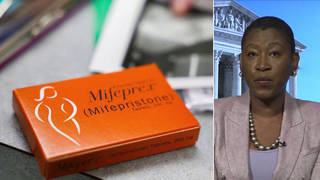




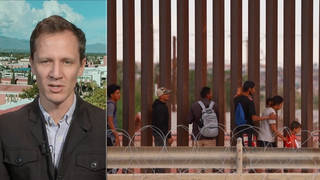
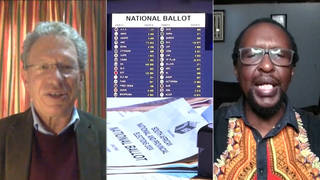
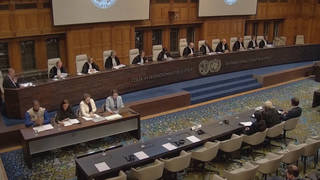

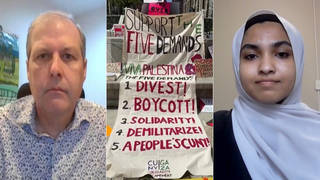
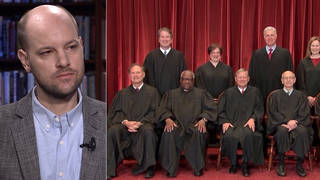
Media Options